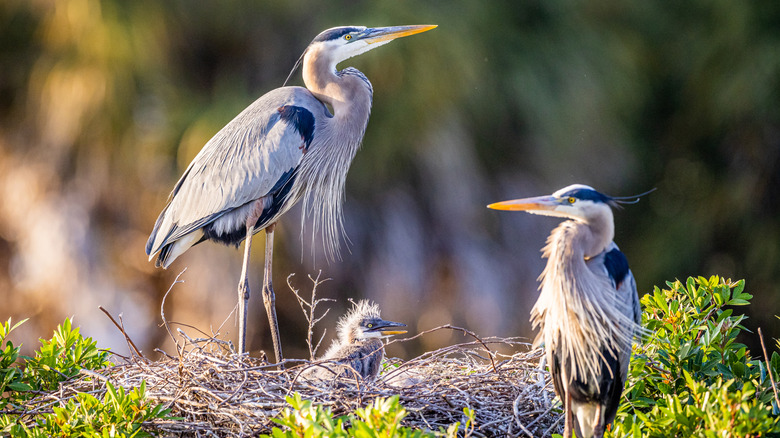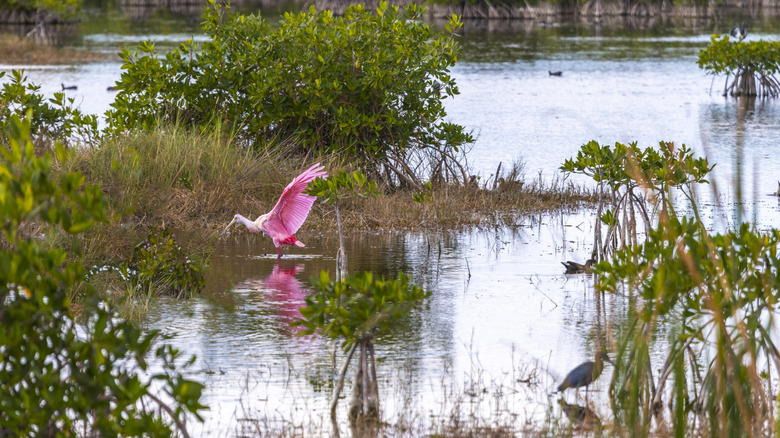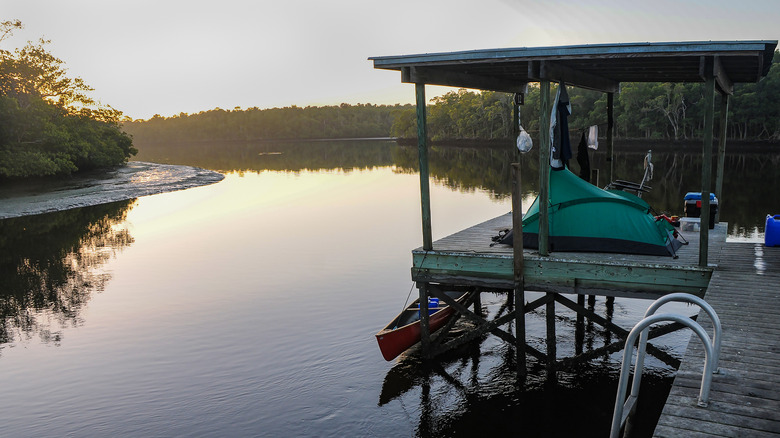Florida's Wildly Underrated National Park Is Home To Many Endangered Species, Trails, And Unique Experiences
Deep in South Florida and spanning 1.5 million acres, Everglades National Park is the third largest park in the contiguous United States (only Yellowstone National Park and Death Valley National Park are larger). As a World Heritage Site and Biosphere Reserve, the Everglades wilderness encompasses a massive marsh and sawgrass interior, as well as a maze of mangroves and coastal islands known as the 10,000 Islands Wildlife Refuge. The refuge extends into the waters surrounding Naples, Florida, where pristine beaches await on these lesser-known islands.
Hikers can explore the many trails of Everglades National Park on land, but what makes the park truly unique is that visitors can experience the park via waterway trails on a kayak or canoe trip. Guided boat tours are also available, including backcountry tours on pontoons or thrilling airboat rides that offer opportunities to see wildlife up close. Although American alligators are the main attraction for many visitors, the park is a haven for an array of diverse wildlife, including more than 360 different species of birds and several endangered species.
Wildlife and activities at Everglades National Park
Everglades National Park has 36 species designated as threatened or endangered, including two species that only live in the area: the Florida leafwing butterfly and the Cape Sable seaside sparrow. It's estimated that there are more than 200,000 American alligators in the Everglades, and although far less common (with an estimated 2,000 living around the state of Florida), American crocodiles are also found here. In recent years, Burmese pythons, an invasive species with no natural predators, have been introduced to the Glades and have become a serious problem for the other wildlife.
Other mammals in the Everglades include the endangered Florida panther, although there aren't as many in the park as in other areas due to the watery environment, and the West Indian Manatee, also known as sea cows. Many wading birds reside in the marshes, but the beautiful, Roseate Spoonbills, a rare pink bird with a flat beak, are a standout. Those interested in learning about the wildlife of the Everglades can participate in an educational "wet walk" to experience the watery ecosystem firsthand with a naturalist guide, or book one of the other informative eco-tours.
The Flamingo Visitor Center is accessed through the Homestead park entrance and is a main hub for information and planning. Flamingo is also home to a campground, lodge, and marina with boat and kayak rentals. For an intense kayaking adventure, the 99-mile Everglades Wilderness Waterway connects Flamingo and Everglades City, promising a weeklong adventure in one of America's most wild places. Everglades National Park offers tent camping and wilderness camping platforms called chickees, which provide sublime starry nights, far from city light pollution. A permit is required for wilderness camping.
Planning a trip to Everglades National Park
There are three entrances to Everglades National Park: Shark Valley, Everglades City, and the Homestead entrance (considered the main entrance and home to the Ernest F. Coe Visitor Center). The closest airport is Miami, Florida. It's about a 45-minute drive to the Shark Valley entrance, and 50 minutes to the Homestead entrance. Alternatively, Fort Lauderdale is another airport option that is only about an hour's drive from Shark Valley.
If you can only visit for a day, several bus tours are available from Miami that offer a combination of transportation and activities (like airboat rides), or you can book similar adventures from Naples. A variety of hotels and lodging options are available, depending on the area you wish to visit. Near the Flamingo and Coe Visitor Centers, you might look in the towns of Florida City or Homestead. Shark Valley is conveniently located near Miami's western suburbs, while Everglades City is the nearest to Marco Island and Naples.
If you also plan on visiting neighboring Big Cypress National Preserve, consider staying in Everglades City, a wildly underrated Gulf Coast gateway with unique outdoor activities, for easy access to both parks. Be aware that as of summer 2025, the Gulf Coast Visitors Center is temporarily closed for repairs. The Everglades City entrance is a little over an hour's drive to Southwest Florida International Airport in Fort Myers.


